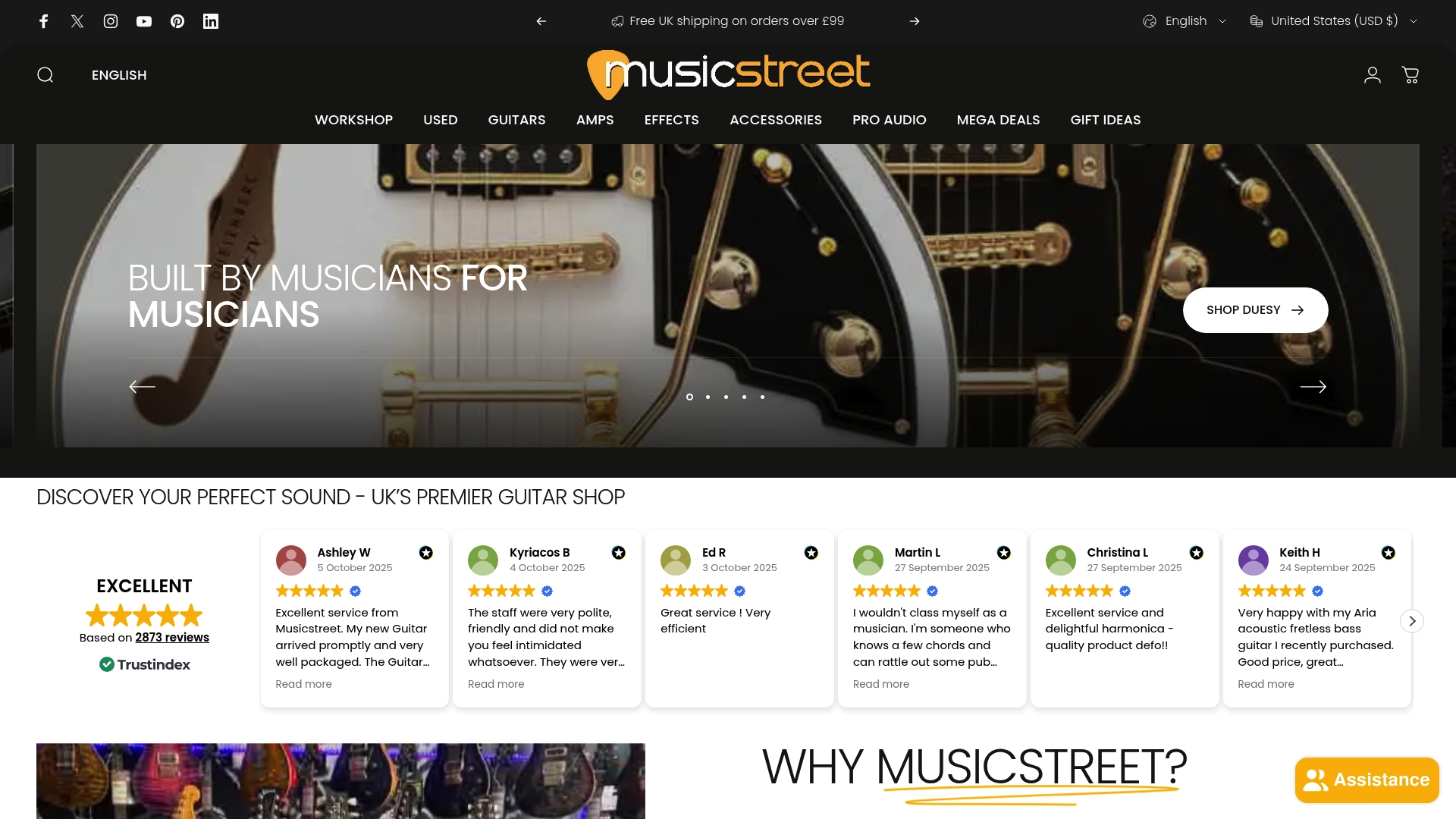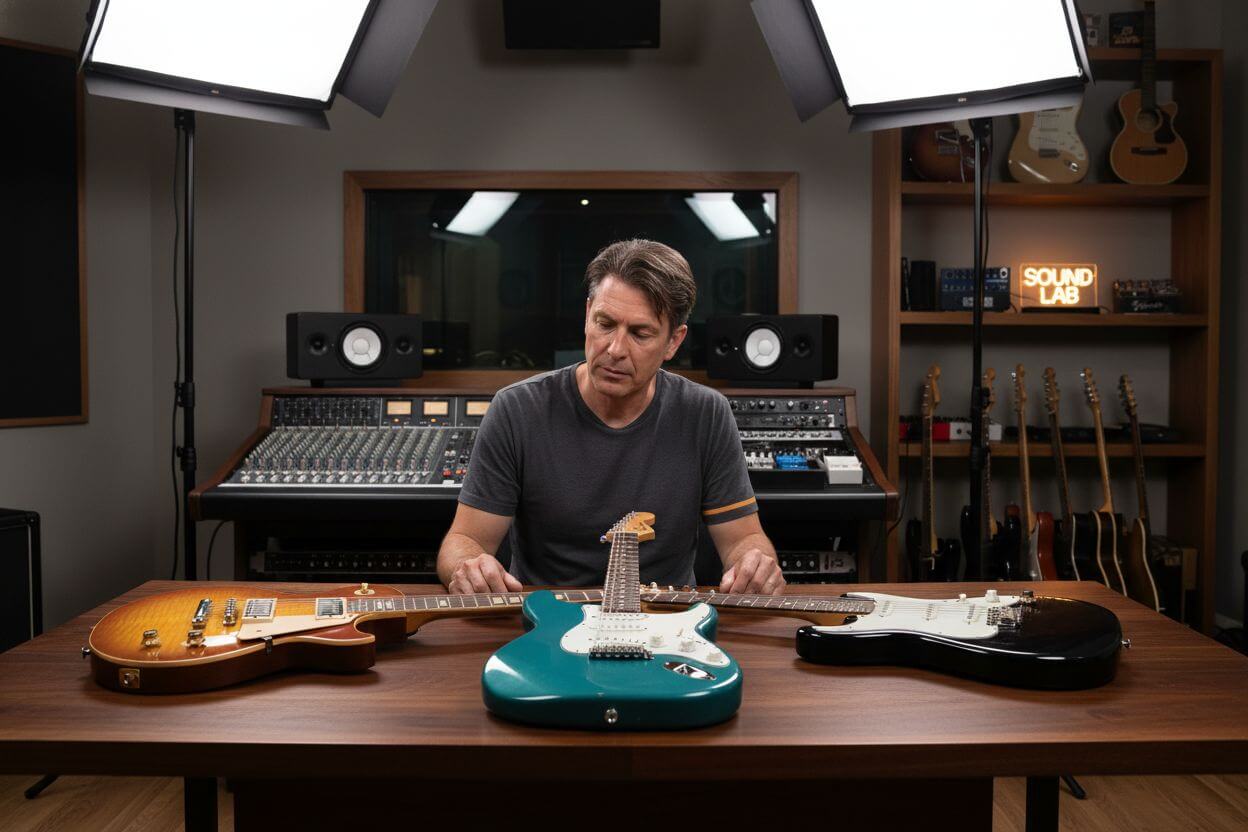Over 70 percent of guitarists say brand reputation sways their buying decisions more than price or looks. For musicians, a guitar is far more than wood and strings. It serves as a trusted partner that shapes their sound and confidence. Discover how expert craftsmanship, historical legacy, innovation, and ethical practices combine to build lasting trust in the world’s most celebrated guitar brands.
Key Takeaways
| Point | Details |
|---|---|
| Brand Reputation | A guitar brand’s reputation is shaped by craftsmanship, innovation, emotional connection, and perceived value, with sustainability and technology becoming increasingly important. |
| Price Segmentation | Understanding guitar pricing tiers—budget, mid-range, and premium—is crucial for aligning quality with personal musical aspirations. |
| Quality Evaluation | Key evaluation criteria such as tonewood selection, craftsmanship, and electronic components significantly impact a guitar’s performance and playability. |
| Smart Purchasing | Avoid common pitfalls like overspending and neglecting personal style by aligning instrument choices with skill level and musical goals. |
Table of Contents
- What Defines A Guitar Brand’s Reputation
- Comparing Budget, Mid-Range, And Premium Brands
- Key Features And Innovations By Leading Brands
- Evaluating Quality: Materials, Craftsmanship, And Sound
- Cost, Value, And Common Buying Pitfalls
What Defines a Guitar Brand’s Reputation
A guitar brand’s reputation emerges from a complex interplay of craftsmanship, innovation, emotional connection, and perceived value that transcends mere instrument manufacturing. According to research from Music Mentor, brands like Martin and PRS have distinguished themselves through superior materials and meticulous construction methods that resonate deeply with musicians worldwide.
Critical factors that shape a guitar brand’s standing include:
- Quality of materials (premium tonewoods, hardware)
- Precision of manufacturing techniques
- Historical legacy and storytelling
- Innovative design approaches
- Consistent performance across different price points
Modern guitar brands are increasingly recognising that reputation extends beyond traditional metrics. As recent industry trends indicate, sustainability initiatives and technological integration are becoming pivotal in defining brand perception. Ethically sourced woods, alternative materials, and advanced production techniques using AI and automation are now significant reputation builders.
Ultimately, a guitar brand’s reputation is a delicate ecosystem where technical excellence meets emotional resonance. Exploring the Best High-End Electric Guitar Brands reveals how top manufacturers craft narratives that transform instruments from mere objects into musical companions that inspire and elevate musicians’ creative journeys.
Comparing Budget, Mid-Range, and Premium Brands
Navigating the guitar market requires understanding the distinct characteristics and value propositions across different price segments. According to research from Boutique Tone, guitar pricing spans a wide spectrum: entry-level guitars range from £200 to £500, mid-range guitars occupy the £500 to £1,000 territory, and professional-grade instruments start around £2,500, potentially exceeding £5,000.
Key characteristics of each guitar tier include:
Here’s a structured comparison of guitar tiers and their typical features:
| Price Tier | Typical Price (USD) | Key Features | Example Brands/Models |
|---|---|---|---|
| Budget | £200-£500 | Basic build Standard hardware Limited tonal range |
Squier Yamaha Pacifica |
| Mid-Range | £500-£1,000 | Improved craftsmanship Better tonewoods Enhanced playability |
Fender Player Epiphone Les Paul |
| Premium | £1,600+ | Exceptional quality Premium materials Handcrafted elements |
Gibson Les Paul Fender American Pro |
- Budget Guitars (£200-£500)
- Basic construction quality
- Suitable for beginners and casual players
- Standard materials and hardware
- Limited tonal complexity
- Brands like Squier represent this segment
- Mid-Range Guitars (£500-£1,000)
- Improved craftsmanship
- Better quality woods
- Enhanced playability
- More refined sound characteristics
- Examples include Fender Player and Epiphone Les Paul models
As research from Slash Gear indicates, premium instruments from manufacturers like Fender American Professional or Gibson Les Paul Special typically start between £1,600 and £1,800, representing the pinnacle of guitar engineering. These instruments offer:
- Exceptional build quality
- Premium tonewoods
- Handcrafted components
- Superior electronics
- Remarkable sonic versatility

What makes the ultimate guitar? provides deeper insights into how musicians can select the right instrument across these price ranges, ensuring their investment matches their musical aspirations and technical requirements.
Key Features and Innovations by Leading Brands
Guitar manufacturers continually push technological boundaries, transforming instrument design through groundbreaking innovations that redefine musical possibilities. Technological advancement has become a critical differentiator in the competitive guitar market, with brands introducing unique features that enhance playability, sound quality, and musician experience.
Some remarkable brand-specific innovations include:
- G&L Guitars: Pioneered Magnetic Field Design (MFD) pickups allowing individual string output control
- Advanced vibrato systems like Dual-Fulcrum Vibrato for improved tuning stability
- Innovative Saddle-Lock bridges to reduce mechanical movement
According to Guitar World, recent hardware innovations have dramatically expanded guitar capabilities. Notable developments include:
- EverTune bridge: Guarantees perfect tuning stability
- CSL Sophia tremolo: Enables precise pitch control
- Fishman Fluence multi-voice pickups: Offer unprecedented tonal versatility
- Convenient headstock tuners like Snark for quick, accurate tuning
The History of Gibson Guitars reveals how continuous innovation transforms musical instruments from simple tools to sophisticated creative platforms. These technological leaps demonstrate how leading brands don’t just manufacture guitars—they engineer musical experiences that inspire and empower musicians across skill levels and genres.
Evaluating Quality: Materials, Craftsmanship, and Sound
The essence of a high-quality guitar transcends mere aesthetics, diving deep into materials, construction techniques, and sonic performance. According to research from Music Mentor, brands that prioritize exceptional materials and precise construction consistently deliver superior playability and sound that elevates the entire musical experience.
Key quality evaluation criteria include:
- Tonewood Selection: Premium woods that offer optimal resonance
- Neck Construction: Comfortable profile and smooth playability
- Fretwork: Precision and evenness across the fingerboard
- Electronic Components: High-quality pickups and circuitry
- Hardware Durability: Robust bridge and tuning mechanisms
Interestingly, emerging technologies are challenging traditional manufacturing approaches. Research from academic sources reveals fascinating developments like 3D-printed guitars made from PLA, presenting sustainable alternatives to traditional endangered tonewoods while maintaining impressive tonal characteristics. These innovations suggest that quality is no longer confined to conventional production methods.
Are ‘High End’ guitars that much better? explores how discerning musicians can distinguish genuine quality from marketing hype, emphasizing that true craftsmanship combines materials, design, and sound into an instrument that becomes an extension of the artist’s musical voice.
Cost, Value, and Common Buying Pitfalls
Navigating the guitar market requires a strategic approach to balancing cost, quality, and personal musical aspirations. According to research from Boutique Tone, understanding price brackets is crucial for making informed purchasing decisions. Buyers can expect three primary investment tiers: beginner range (£200-£500), mid-range (£500-£1,000), and professional instruments starting at £2,500.
Common buying pitfalls to avoid include:
- Overspending beyond skill level
- Neglecting personal playing style
- Prioritizing brand name over playability
- Ignoring potential modification costs
- Underestimating maintenance expenses
Research from Oscar on Guitars reveals an intriguing perspective: affordable guitars offer significant advantages. Modern budget instruments provide excellent quality, reduce performance anxiety, and allow musicians to explore multiple instrument types without substantial financial risk. Cheaper guitars also present unique benefits like easier modification and lower replacement costs if damaged.
Most importantly, value transcends price tag. The importance of quality for beginners illustrates that smart purchasing means matching an instrument to your current skills, musical goals, and potential for growth. Whether you’re a novice or experienced player, the right guitar is an investment in your musical journey—not just a transaction.
Discover the Perfect Guitar Match With MusicStreet
Struggling to tell the difference between a budget instrument and a true high-end gem? Our Complete Guide to Guitar Brands explains just how important quality, craftsmanship and value are—yet making the best choice can still feel overwhelming. Whether you are unsure about materials, want to avoid common buying mistakes or crave clarity on what sets premium guitars apart, you deserve trusted, hands-on support.

Take the guesswork out of your next purchase. Explore our carefully selected collection of new and pre-owned guitars, each one meticulously checked and photographed so you can shop with total confidence. With guidance from our team and helpful resources like the importance of quality for beginners, finding your ideal fit is easier than ever. Visit MusicStreet.co.uk today and experience a premium, customer-focused service that supports every step of your musical journey—online or in-store. The right guitar is waiting for you now.
Frequently Asked Questions
What factors contribute to a guitar brand’s reputation?
A guitar brand’s reputation is shaped by the quality of materials, precision of manufacturing techniques, historical legacy, innovative design, and consistent performance across various price points.
How do budget, mid-range, and premium guitars differ in terms of features?
Budget guitars (£200-£500) typically have basic construction and limited tonal range. Mid-range guitars (£500-£1,000) offer improved craftsmanship and better tonewoods. Premium guitars (£1,600+) feature exceptional quality, premium materials, and handcrafted elements.

What are some common pitfalls when buying a guitar?
Common pitfalls include overspending beyond your skill level, neglecting your personal playing style, prioritising brand names over playability, and underestimating maintenance expenses.
How can I evaluate the quality of a guitar?
Evaluate a guitar’s quality by examining tonewood selection, neck construction, fretwork precision, electronic components, and hardware durability. Look for premium materials and craftsmanship to ensure superior playability and sound.
Recommended
- Exploring the Best High-End Electric Guitar Brands | MusicStreet
- Are ‘High End’ guitars that much better? - MusicStreet
- 4 Electric Guitars Worth Over £2000 And Are Worth It | MusicStreet
- The importance of quality for beginners | MusicStreet
- Top Budget Photography Gear – Expert Comparison 2025 - Amateur Photographer Guide
- Best Midi Controllers: Your Ultimate Guide for Every Budget




Share:
Fender vs Gibson: Which Brand is Right for You? – Expert Comparison 2025
7 Essential Types of Electric Guitars Every Player Needs